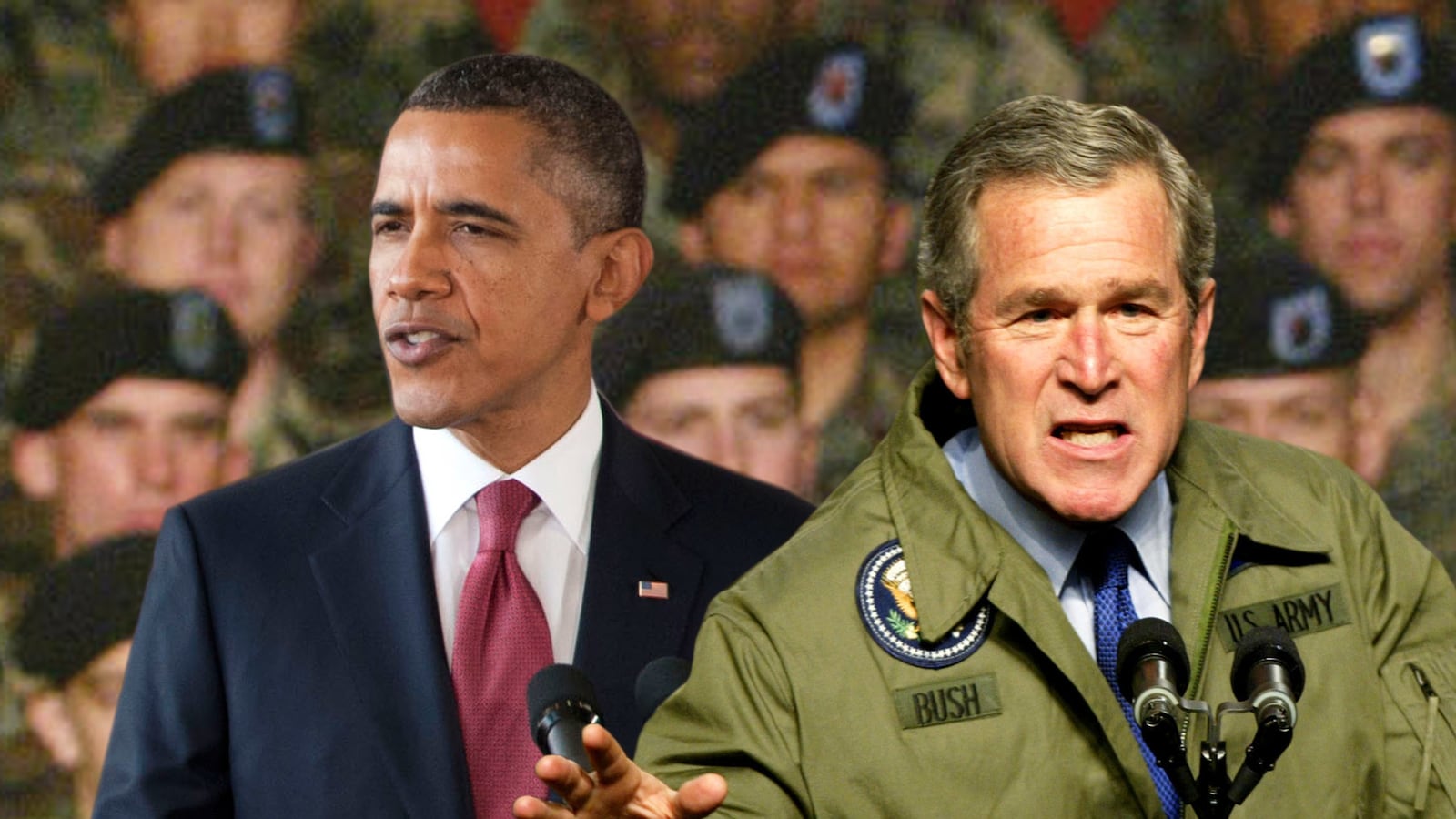Last week, a Politico reporter phoned me to ascertain my thoughts on the new war. Among the questions: Was there concern among liberals that Barack Obama was in some sense now becoming George Bush, and did I see similarities between the current war and Bush’s Iraq war that, come on, be honest, made me squirm in my seat ever so slightly? My answer ended up on the cutting-room floor, as many answers given to reporters do.
But since I’m fortunate enough to have a column, I’d like to broadcast it now, because the answer is a reverberating no. In fact it’s hard for me to imagine how the differences between the two actions could be starker. This is not to say that they might not end up in the same place—creating more problems than they solve. But in moral terms, this war is nothing like that war, and if this war doesn’t end up like Bush’s and somehow actually solves more problems than it creates, that will happen precisely because of the moral differences.
The first and most important difference, plainly and simply: Obama didn’t lie us into this war. It’s worth emphasizing this point, I think, during this week when Obama is at the United Nations trying to redouble international support to fight ISIS, and as we think back on Colin Powell’s infamous February 2003 snow job to Security Council. Obama didn’t tell us any nightmarish fairy tales about weapons of mass destruction that had already been destroyed or never existed. He didn’t trot his loyalists out there to tell fantastical stories about smoking guns and mushroom clouds.
The evidence for the nature of the threat posed by the Islamic State is, in contrast, as non-fabricated as evidence can be and was handed right to us by ISIS itself: the beheading videos, and spokesmen’s own statements from recruitment videos about the group’s goal being the establishment of a reactionary fundamentalist state over Iraq, Syria, Jordan, and Lebanon. That’s all quite real.
Difference number two: This war doesn’t involve 140,000 ground troops. That’s not just a debating point. It’s a massive, real-world difference. I know some of you are saying, well, not yet, anyway. Time could prove you right. But if this works more or less as planned, it establishes a new model for fighting terrorism in the Middle East—the United States and Arab nations and fighting forces working together to do battle against terrorism. That’s kind of a huge deal.
Which leads us to difference number three: This coalition, while still in its infancy, could in the end be a far more meaningful coalition than Bush’s. The Bush coalition was an ad hoc assemblage bribed or browbeaten into backing the United States’ immediate geopolitical aims. It was brought together pretty much so Bush could deflect the essentially true unilateralist charge and stand up there and say “41 countries have joined together” blah blah blah.
This coalition is smaller, but the important point is that it’s not built around a goal that is in the interest only of the United States. Defeating the Islamic State is a genuine priority for the region, and the idea that these gulf states that have been winking at or backing violent extremism for years might actually work with the United States of America (!) to fight it is little short of amazing. I’m not saying Obama deserves the credit here, although it seems clear he and others in the administration have worked hard on this point. Rather, the fact is that the Saudis and the Emiratis and others are now doing, however reluctantly, what it’s in their self-interest to do.
Whatever their motivation, the mere fact that they’re signing up for the fight is striking. One should never be optimistic about the Middle East, but if we look at the situation with a little more historical sweep, we can hope that this could be the moment when, after many years of letting these cancers spread, some key players in the Arab world start to try to get their own house in order a little bit with respect to extremism. And if they do that, maybe in the near future some of these regimes will start to see that the darkness in which they make their subjects live has to be lifted.
The irony is not lost on me that Saudi Arabia, our most crucial partner here, may well have beheaded more humans this year (46 so far) than ISIS has. But if these autarkies really do work to arrest the Islamic State, maybe they’ll eventually see that the only real way to make extremism seem unappealing is to make moderation—well-functioning economies, a little free speech, maybe an unrigged election now and again—seem appealing.
There are many ways that what started in Syria Monday night can go wrong. I really don’t think Bashar al-Assad shooting down a U.S. plane is one of them; I suspect Assad knows exactly how long it would take for the United States to decimate his entire air-defense system, and I bet the answer is “not very long.” However, ISIS could shoot one down. What happens to public opinion when there’s an American death, or two? When the Iraq army, even with the benefit of 200 U.S. airstrikes, can’t retake any ground, as appears to be happening now? And what would Congress do in the event of such realities? At the very least Obama does have to get congressional assent in the near future.
So this war could end up being the disaster critics are predicting. But already, it’s not some other things. It’s not a morally dubious hegemonic enterprise built on a pile of lies. That may or may not give it a better chance of success, but at least it means we don’t have to be ashamed of what our country is doing.





